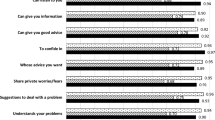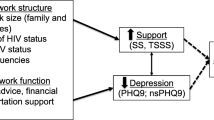This paper investigates the association between social support, disclosure of HIV/AIDS, and odds of initiating combination antiretroviral drug therapy in its first years on the market. Data are drawn from the first three rounds of the Community Health Advisory and Information Network (CHAIN) survey, collected between 1994 and 1997. CHAIN documents service needs and rates of service utilization among a representative sample of persons with HIV/AIDS in New York City. A two-step logistic regression estimated associations between (1) perceived social support and use of combination antiretroviral therapy, and (2) the interaction between concealing HIV/AIDS and perceived social support. Results offered evidence that the positive association between social support and use of highly active antiretroviral treatment (HAART) and other combination antiretroviral therapies is contingent upon disclosure of HIV status within the household or among friend and acquaintance networks. A positive association between social support and odds of using combination therapy was only observed among those who disclosed their HIV status.


Similar content being viewed by others
REFERENCES
Bartelli, D. (2000). The company they keep. Dr. PH. dissertation, Department of Sociomedical Sciences, Mailman School of Public Health, Columbia University, New York, NY.
Chesney, M. A., and Smith, A. W. (1999). Critical delays in HIV testing and care. American Behavioral Scientist, 42 1158–1170.
Cunningham, W. E., Hays, R. D., Ettl, M. K., Dixon, W. J., Liu, R. C., Beck, C. K., and Shapiro, M. F. (1998). The prospective effect of access to medical care on health-related quality-of-life outcomes in patients with symptomatic HIV disease. Medical Care, 36 295–306.
Ennett, S. T., Bailey, S. L., and Federman, E. B. (1999). Social network characteristics associated with risky behaviors among runaway and homeless youth. Journal of Health and Social Behavior, 40 63–78.
Fife, B. L., and Wright, E. R. (2000). The dimensionality of stigma: A comparison of its impact on the self of persons with HIV/AIDS and cancer. Journal of Health and Social Behavior, 41 50–67.
Fortenberry, J. D., McFarlane, M., Bleakley, A., and Bull, S. (2002). Relationships of stigma and shame to gonorrhea and HIV screening. American Journal of Public Health, 92 378–381.
Goffman, E. (1963). Stigma: Notes on the Management of Spoiled Identity. Englewood Cliffs, NJ: Prentice-Hall.
Hammer, M. (1983). “Core” and “extended” social networks in relation to health and illness. Social Science and Medicine, 17 405–411.
Herlitz, C. A., and Steel, J. L. (2001). Highly active antiretroviral therapy (HAART): Awareness and beliefs about infectivity and the influence on sexual behaviour in the general population of Sweden. European Journal of Public Health, 11 251–256.
Johnston, D., Stall, R., and Smith, K. (1995). Reliance by gay men and intravenous drug users on friends and family for AIDS-related care. AIDS Care, 7 307–319.
Klitzman, R., and Bayer, R. (2003). Mortal Secrets: Truth and Lies in the Age of AIDS. Baltimore, MD: The Johns Hopkins University Press.
Link, B. G., and Phelan, J. C. (2001). Conceptualizing stigma. Annual Review of Sociology, 27 363–385.
Litwak, E., and Messeri, P. A. (1989). Organizational theory, social supports, and mortality rates: A theoretical convergence. American Sociological Review, 54 49–66.
Messeri, P. A., Lee, G., Abramson, D. M., Aidala, A. A., Chiasson, M. A., and Jessop, D. J. (2003). Antiretroviral therapy and declining AIDS mortality. Medical Care, 41 512–521.
Resnick, M. D., Bearman, P. S., Blum, R. W., Bauman, K. E., Harris, K. M., Jones, J., Tabor, J., Beuhring, T., Sieving, R. E., Shrew, M., Ireland, M., Bearinger, L. H., and Udry, J. R. (1997). Protecting adolescents from harm: Findings from the National Longitudinal Study of Adolescent Health. Journal of the American Medical Association, 278 823– 832.
Steward, A. L., Hayes, R. D., and Ware, J. E. (1991). The MOS short-form general health survey: Reliability and validity in a patient population. Medical Care, 26 724–730.
Turner, R. J., and Turner, J. B. (1999). Social integration and support. In C. S. Aneshensel, and J. C. Phelan (Eds.), Handbook of the Sociology of Mental Health. New York: Kluwer Academic/Plenum Publishers.
Valdiserri, R. O. (2002). HIV/AIDS stigma: An impediment to public health. American Journal of Public Health, 92 341–342.
Wasserman, S., and Faust, K. (1994). Social Network Analysis Methods and Applications. Cambridge, NY: Cambridge University Press.
Wright, E. R., and Fife, B. L. (1999). Social support and the stigma of HIV/AIDS and cancer. Presented at the Annual Meeting of the American Sociological Association Annual Meetings, August 6–10, 1999, Chicago, IL.
ACKNOWLEDGMENTS
This research was supported by grant number H89 HA 0015-12 from the U.S. Health Resources and Services Administration (HRSA) HIV/AIDS Bureau with the support of the HIV Health and Human Services Planning Council, through the New York City Department of Health and Mental Hygiene and the Medical and Health Research Association of New York City, Inc. (MHRA). While working on this project, the first author was supported as a postdoctoral fellow in the Behavioral Sciences Training in Drug Abuse Research Program sponsored by Medical and Health Association of New York City, Inc. and the National Development and Research Institutes (NDRI) with funding from the National Institute on Drug Abuse (5T32 DA07233). Points of view, opinions, and conclusions in this paper do not necessarily represent the official position of the U.S. Government, Medical and Health Association of New York City, National Development and Research Institutes, or the New York City Department of Health and Mental Hygiene.
Author information
Authors and Affiliations
Corresponding author
Rights and permissions
About this article
Cite this article
Waddell, E.N., Messeri, P.A. Social Support, Disclosure, and Use of Antiretroviral Therapy. AIDS Behav 10, 263–272 (2006). https://doi.org/10.1007/s10461-005-9042-x
Published:
Issue Date:
DOI: https://doi.org/10.1007/s10461-005-9042-x




